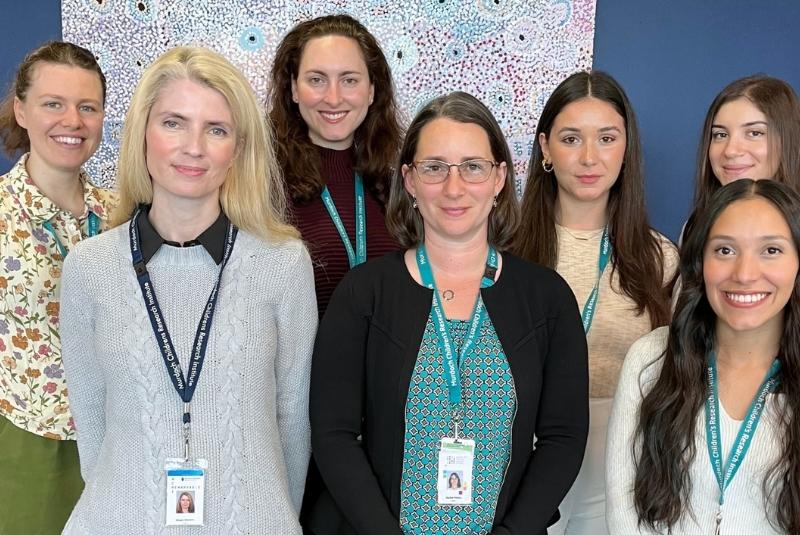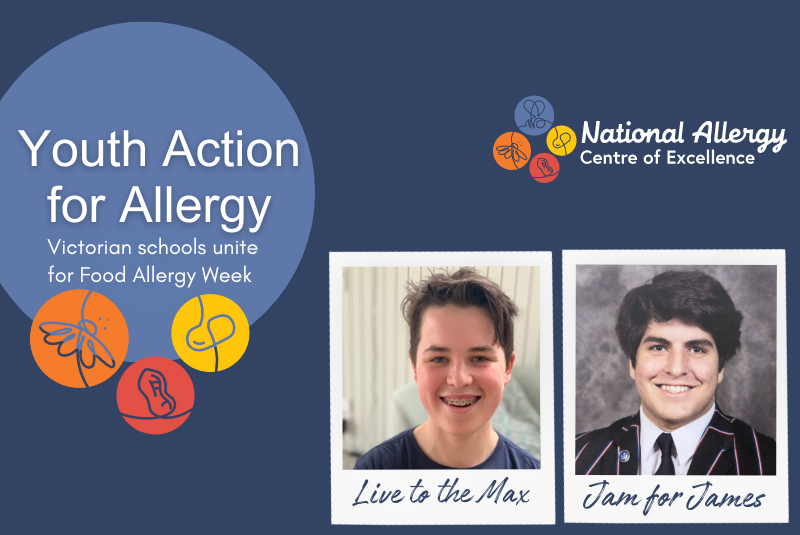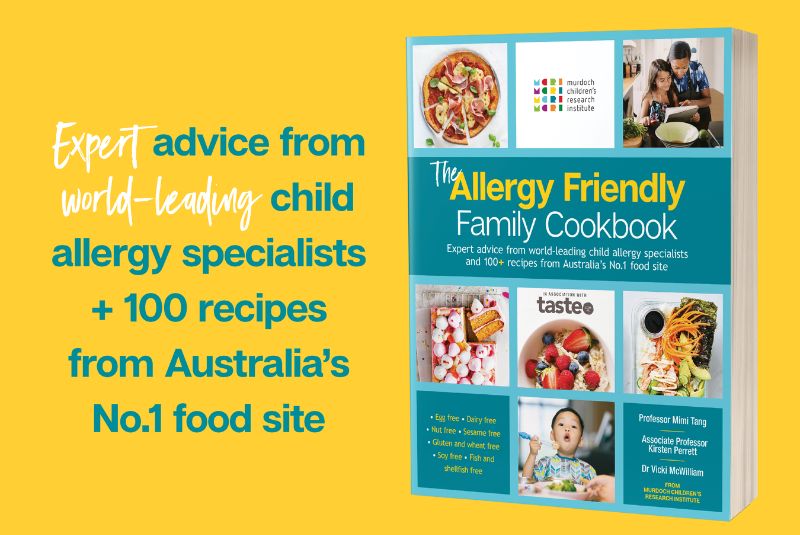Centre for Food and Allergy Research

We use the latest approaches in epidemiology, immunology, paediatrics, nutrition, gastroenterology and biostatistics to investigate factors that cause, prevent and improve food allergies.
The Centre for Food and Allergy Research is a collaboration of experts in children’s food allergy and food-related immune disorders.
The Centre for Food and Allergy Research is a collaboration of experts in children’s food allergy and food-related immune disorders.
Why research food allergy?
The number of children with a food allergy or food-related immune disorder has soared in the last 10 years.
In fact, in 2011 the Murdoch Children's Research Institute found that 10 percent of 12-month-old infants have a clinically confirmed food allergy, one of the highest reported rates in the world.
Food allergies can be really uncomfortable and even life threatening.
While mild symptoms include hives and swelling, severe symptoms such as breathing difficulties (called anaphylaxis) can be life threatening. Food allergies also affect a person’s quality of life as they need to be really careful they don’t accidentally eat something that contains the food they’re allergic to.
Researchers don’t yet know why food allergies develop.
We know they run in families, but your family history or genetics is only part of the story. Non-genetic (or environmental) factors also play a part.
More information
Our people
Dr Jennifer Koplin (Director), Epidemiologist
Dr Jennifer Koplin is a National Health and Medical Research Council (NHMRC) funded fellow in epidemiology of allergic disease and senior researcher at the Murdoch Children's Research Institute. She completed her PhD in 2011 on the epidemiology of childhood food allergy at the University of Melbourne. She has contributed to the development of public health and clinical guidelines in Australia and internationally and was directly involved in developing the recent National Institute of Allergy and Infectious Disease (NIAID) peanut allergy prevention guidelines which had worldwide uptake, as well as in producing Australian Infant Feeding Guidelines.
Dr Koplins' research was used to help develop European Academy of Allergy and Clinical Immunology (EAACI) Food Allergy & Anaphylaxis Guidelines and the US National Academies of Sciences Report on Food Allergy. She is the lead investigator of the HealthNuts and EarlyNuts studies.
Professor Anne-Louise Ponsonby, Epidemiologist and Public Health Physician
Anne-Louise is a senior researcher at the Murdoch Children's Research Institute and the Australian National University. Anne-Louise’s research focuses on large, population-based studies of immune disorders and the impact of environments in the first years of life on our health. Her research into sudden infant death syndrome helped reduced SIDS-related deaths by half during the 1990s.
She is a principal investigator in the Barwon Infant Study and a chief investigator in HealthNuts and the Probiotic and Peanut Oral Immunotherapy trial. Anne-Louise is also a professor and senior lecturer at the University of Melbourne Department of Paediatrics and the Australian National University Medical School.
Professor Shyamali Dharmage, Epidemiologist
Shyamali is a senior researcher at the University of Melbourne and Murdoch Children's Research Institute. She is head of the Research Program in Allergy and Respiratory Diseases at the Centre for Epidemiology and Biostatistics at the University of Melbourne. Shyamali has extensive experience with large epidemiological studies and is the principal investigator of the Melbourne Atopy Cohort Study and Tasmanian Longitudinal Health Study. She is also a chief investigator of six other Australian and international population-based allergy and asthma studies, including HealthNuts and SchoolNuts. Shyamali is a professor and senior lecturer at the University of Melbourne School of Population and Global Health.
Professor Mimi Tang, Paediatric Allergist, Immunologist and Immunopathologist
Mimi is a senior doctor and Head of the Department of Allergy and Immunology at The Royal Children’s Hospital in Melbourne. She is also senior researcher and leader of the Allergy and Immune Disorders Research Group at the Murdoch Children's Research Institute. Mimi is the principal investigator in the Probiotic and Peanut Oral Immunotherapy trial and a chief investigator in epidemiological studies of food allergy, including HealthNuts and SchoolNuts.
She has been involved in the development of national guidelines on the ‘Prevention of Allergic Disease’ and ‘Infant Feeding Advice’; Victorian Anaphylaxis Guidelines and Policy for Schools and Children’s Services and state legislation mandating anaphylaxis management in schools and children’s services. She has also written a book with Katie for families called Kids' Food Allergy for Dummies. Mimi is a Professor at the University of Melbourne Department of Paediatrics.
Professor Dianne Campbell, Paediatric Allergist
Dianne is a senior doctor and Chair of Allergy and Clinical Immunology at the Children’s Hospital in Westmead, Sydney. She is also a Professor and Head of Paediatrics and Child Health at the University of Sydney. She is a chief investigator in the BEAT, Vitamin D in the management of Childhood Atopic Dermatitis (ADDVIT) study and the BAKE study. Dianne also oversees the paediatric curriculum across the graduate and postgraduate coursework programs in the University of Sydney's Medical School.She is the current Chair of the Paediatric Subcommittee of the Australian Society for Clinical Allergy and Immunology (paediatric subcommittee).
Professor Susan Prescott, Paediatric Allergist and Immunologist
Susan is a senior doctor at the Children’s Hospital in Perth and a senior researcher at the University of Western Australia and the Telethon Kids Institute. She also heads a research group that focuses on the developing immune system. Susan’s research explores the development of the immune system and the early life factors involved in the development of inflammatory diseases such as food allergy. She is the principal investigator in the EPIGEN study and a chief investigator in a range of clinical trials aimed at preventing food allergies (STEP, STAR, QuEST, DOMInO, VITAL).
In 2010, the National Health and Medical Research Council recognised her research as being among the ten best in Australia. Susan has also written a book called The Allergy Epidemic. Susan is a Winthrop Professor and senior lecturer at the University of Western Australia, School of Paediatrics and Child Health.
Professor Richard Saffery, Molecular and Cellular Biologist
Richard is a NHMRC Senior Research Fellow with over 20 years' of experience in Molecular and Cellular biology, including 15 years in Human Epigenetics. He heads the Cancer & Disease Epigenetics (CDE) laboratory at Murdoch Children's Research Institute that uses state-of-the-art multidisciplinary approaches, encompassing genetic, environmental and epigenetic analyses, to understand childhood development and complex disease.
Professor Lyle Gurrin, Biostatistician
Lyle is a senior researcher at the University of Melbourne and Murdoch Children's Research Institute. Lyle has twenty years’ experience identifying the genetic and environmental factors involved in complex diseases and has contributed to the development of statistical methods that make this possible. He is a chief investigator on a range of NHMRC-funded projects in food allergy and asthma, including HealthNuts and SchoolNuts, the Melbourne Atopic Cohort Study and the Tasmanian Longitudinal Health Study. Lyle is an associate professor and senior lecturer at the University of Melbourne School of Population and Global Health.
Doctor Kirsten Perrett, Paediatric Allergist and Vaccinologist
Kirsten is a senior researcher and Clinician Scientist Fellow in the Melbourne Children's Trail Centre at the Murdoch Children's Research Institute. She is also a Paediatric Allergist and Vaccinologist at the Department of Allergy and Immunology and General Medicine at the Royal Children's Hospital and Honorary Research Fellow at The University of Melbourne, Melbourne Australia. She has extensive experience in leading Investigator-led and Industry-sponsored vaccine clinical trials and in vaccine safety research.
Over the last 5 years, Kirsten’s research focus has developed, and she now co-leads a program of research investigating, testing and translating new strategies for the prevention, diagnosis and treatment of food allergy. Kirsten heads the clinical trials research stream and leads the Vitality (vitamin D), TreEat (tree nut) and Optimum (wP vaccine) trials to prevent food allergy and Epitope, a treatment (epicutaneous immunotherapy) trial for peanut allergy. She leads the pragmatic population health research trials stream: MIST RCT (medical therapy to treat sleep disordered breathing), and the MIP RCTs (novel strategies to minimise immunisation pain).
Kirsten leads a National collaboration on Vaccine Allergy. She is a Key Opinion Leader for the conduct of Investigator-led and Industry-Sponsored clinical trials in Allergy and Vaccinology.
Associate Professor Kim Dalziel, Health Economist
Kim joined the School of Population and Global Health at the University of Melbourne in January 2013. She undertook a Harkness Fellowship with The Commonwealth Fund, based at the University of Michigan for 2017/18. Kim is an Associate Professor and Deputy Director of the Health Economics Group, Centre for Health Policy. She leads a program of research in child health and has specialist expertise in economic evaluation and modelling, child health policy, vulnerability/equity and use of health services and economic evaluation alongside clinical trials.
Our projects
HealthNuts
Childhood food allergy has become a major public health problem. The extremely rare but devastating consequences of sudden death magnify concern over the rapidly rising incidence of food allergy in a healthy child.
The HealthNuts study of 5,300 children is the world's first comprehensive population-based study of food allergy with the aim measurement of true food allergy.
It will enable us to better understand the natural history of allergic disorders, including food allergy, asthma, eczema and hay fever and the risk factors for developing these conditions in childhood. The study will have important implications for clinical guidelines and public health policy.
Age 4-year-old phase
As children turned four years of age, we asked parents to fill out a short questionnaire, and any HealthNuts children we'd seen previously or those who reported a new food allergy were invited to the RCH for further allergy testing.
Age 6-year-old phase
As children turned six years of age, we contacted parents to fill out a short questionnaire, and ALL HealthNuts children were invited to have a free allergy health check.
Age 10-year-old phase
As children turned ten years of age, parents were asked to fill out a short questionnaire, and ALL HealthNuts children were again invited to have a free allergy health check.
Age 15-year-old phase
Our participants are now turning 15 years old. We are excited to announce that we have funding to follow up children at 15 years of age.
SchoolNuts
Who's affected by allergies?
Allergic disease affects up to 40 percent of Australian children, and the incidence continues to rise at an alarming rate. Food allergy is a serious public health issue, emerging over the last 10 - 15 years as a 'second wave' of allergy epidemic.
It is unclear why this recent phenomenon of allergies has lagged decades behind the 'first wave' of asthma, hay fever and inhalant sensitization. Hospital admissions for anaphylaxis, the most severe form of food allergy, has trebled in the past 15 years.
This new generation appears less likely to outgrow food allergy with long-term implications for allergic disease burden into later life.
Allergies and asthma
Emerging evidence also suggests the IgE-mediated food allergy is a predictor not only for the development of asthma but also appears to increase the risk of poorly controlled asthma. The prevalence of asthma in Australia is among the highest in the world, affecting between 10% and 15% of children. This study aims to determine prevalence and associated risk for food allergy in school-aged children, assess impact of food allergy on risk of asthma and severity of asthmatic children and understand factors likely to modify control of both food allergy and asthma.
Barwon Infant Study (BIS)
This study examines the connection between health and development during early life and chronic diseases (including allergic ones).
EPIGEN
This study investigates how a woman’s diet during pregnancy affects the development of her child’s immune system and the risk of developing allergic diseases such as food allergy and eczema.
Melbourne Atopic Cohort Study (MACS)
This study followed children with a family history of allergic disease from birth until 18 years to identify things that increase or decrease the risk of an allergic disease developing.
Vitamin D in Allergy trial (VITAL)
This trial tests what impact a vitamin D supplement given in the first six months of life has on the immune system of children who have a family history of allergic disease.
Questioning the role of Egg in lactation for induction of Specific Tolerance (QuEST)
This trial will test whether the number of eggs a woman eats during pregnancy affects the amount of egg protein in the blood she shares with her baby or in her breast milk after birth.
DOMInO - Docosahexaenoic acid to Optimise Mother Infant Outcome (Allergy Follow-up)
This trial tests whether taking fish oil capsules high in omega 3 during pregnancy helps protect babies from developing an allergic disease.
PPOIT - The Probiotic and Peanut Oral Immunotherapy trial
This trial tests whether a treatment plan involving both probiotics and peanut oral immunotherapy (PPOIT) can help build a tolerance to peanuts in children who are allergic to them.
BEAT - Beating Egg Allergy Trial
This trial tests whether eating egg for the first time at a younger age (between four and six months of age) can help prevent egg allergy in babies at high risk of allergic disease.
CAKE
This trial tests whether eating baked egg regularly helps children who are allergic to raw egg to ‘outgrow’ or build up a tolerance to it.
4-FEED Trial
This trial tests whether avoiding cow’s milk, eggs, wheat and soy is an effective treatment for children with eosinophilic oesophagitis – a condition where the tube connecting the mouth and stomach becomes swollen and painful.
Solids Timing for Allergy Reduction (STAR)
This trial tests whether eating eggs at a younger age helps prevent infants with moderate-to-severe eczema (and accordingly a higher risk of food allergy) from becoming allergic to eggs.
STEP - Starting Time for Egg Protein
This study tests whether eating egg for the first time at a younger age (six months instead of 10 months) may help prevent egg allergy.
PEBBLES
To determine if routine application of an emollient to the skin of infants in early life prevents the development of eczema and food allergy and to investigate if this form of intervention is effective in children with a genetic predisposition (filaggrin null mutation) for having a poor skin barrier and increased risk of developing eczema.
Vitality Trial
This trial examines whether vitamin D supplementation given in the first 12 months of life can prevent the development of food allergy and reduce lower respiratory infections.
Funding
HealthNuts research
- National Health & Medical Research Council
- Ilhan Food Allergy Foundation
- AnaphylaxiStop
- Australian Egg Corporation Pty.
- ALK Abello, S.A. Madrid, España
- US Department of Defense
- The Kimberley Foundation
Collaborations
- Murdoch Children's Research Institute
- University of Melbourne
- University of Western Australia
- Royal Children’s Hospital, Melbourne
- Women’s & Children’s Health Research Institute
- University of Adelaide
- Children’s Hospital at Westmead, Sydney
- Child and Adolescent Health Service, Dept. of Health, Government of Western Australia
- Griffith University
- Children’s Health Queensland
- University of Queensland
- Sydney Children’s Hospital, Randwick
- James Cook University
CFAR board appointments, committees and memberships
- 3-generation study of asthma: International Consortium
- Allergy and Immunology Foundation of Australasia
- American Academy of Allergy
- American Academy of Allergy, Asthma and Immunology (AAAAI)
- Anaphylaxis Australia Medical Advisory
- Asia Pacific Immunoglobulins in Immunology Expert Group
- Australasian Society of Clinical Immunology and Allergy (ASCIA)
- Australian Eosinophilic Oesophagitis support group
- British Paediatric Allergy, Immunity and Infection Group
- European Community Respiratory Health Survey
- European Society of Paediatric Gastroenterology, Hepatology and Nutrition
- Food Allergy and Anaphylaxis Network (FAAN)
- Food Standards Australia New Zealand (FSANZ)
- Ilhan Food Allergy Foundation
- Integrated Approaches to Food Allergen and Allergy Risk Management (iFAAM)
- International Inflammation ‘In-FLAME’ network
- International Union of Immunological Societies
- Nestle Scientific Advisory Board
- NSW Ministry of Health, Department of Education
- Nutricia Medical Advisory Board
- Raising Children Network board
- Royal Australasian College of Physicians (RACP)
- Royal Statistical Society
- Statistical Society of Australia (Incorporated)
- Thoracic Society of Australia and New Zealand
- TVW Telethon Kids Institute
- Victorian Department of Education & Early Childhood Development
- Victorian Department of Health: Anaphylaxis Advisory Group
- World Allergy Organization
Contact us
Centre for Food and Allergy Research
Murdoch Children's Research Institute
The Royal Children's Hospital
50 Flemington Road
Parkville VIC 3052
Australia
Email: show email address










